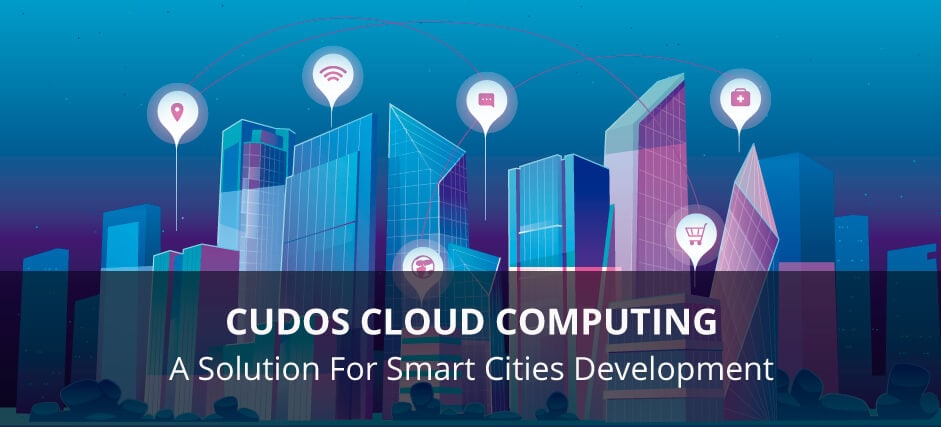The development of urban centers into smart cities requires the search for solutions to manage the large amount of data that their systems produce, as well as the need to use safe methods for its treatment. In the blockchain possibility that CUDOS offers us, with respect to its computing capacity in the cloud, we find the ideal conditions for the development and growth of smart cities.
Smart Cities: The cities of the near future
Today, cities structured the way they are, face challenges to develop in an intelligent and sustainable way, with a view to the near future, where more citizens choose to settle in them. That is why it is necessary to search for solutions that allow sustainable development of these urban centers, in order to provide solutions to citizens, while articulating sustainability plans to address all these issues.
According to the data, at present half of the population lives in urban centers, and it is stipulated that the migration of people towards them will continue to grow in a sustainable way. This issue requires cities to grow in infrastructure and services, which is why the search for sustainable development that can face these challenges is necessary. As a result of this question, the idea of smart cities arises, where their systems are interconnected and solutions for sustainable growth are offered, having the citizen as the axis of the question with a view to a better quality of life.
All these issues are highly complex, requiring technologies and great planning to achieve good results. It is here where blockchain technology presents us with the ideal conditions to be able to manage systems in a decentralized and transparent manner, and together with the computing capacity in the CUDOS cloud, we see the ideal storage conditions for the large amount of data that these centers producing and requiring treatment in a sensitive and safe way.
CUDOS computational capacity for sustainable development
Smart cities cover an ecosystem of a high degree of complexity, where an efficient treatment is required for the generation of data. Smart Cities are equipped with sensors in the streets, vehicles and citizen devices that generate a large amount of data, this data must be stored and treated in a safe way, given that they present a high sensitivity, that is why the ability to cloud computing that the CUDOS network offers and is a central hub for optimal scalable storage processing.
To give an example, regarding the critical systems of a smart city, we have a very important environmental issue, which has to do with the collection and treatment of waste, so it is necessary to have a safe and transparent system where the data, regarding these activities, they can be processed safely and efficiently, while they are stored in a scalable way so that they can be accessed when required, that is why the computing capacity in the cloud provides us here with an interesting solution.
Another essential issue for the operation of smart cities is the interconnection between their different government departments. Currently these departments do not have efficient connection systems between them to obtain data, that is why with the computing capacity in the cloud we can find an efficient tool to fulfill this purpose. The technology of the CUDOS network provides computing capacity in the cloud in a totally decentralized way at low costs, thanks to the benefits of its blockchain infrastructure, which allows it to be accessible to a large number of cities around the world, in addition, when using distributed computational capacity contributes to a sustainability model that reduces pollution levels.
Importance of managing public data in an accessible way
To provide the transparency that is needed in smart cities, the data generated must be public and easily accessible, either by people who need to make inquiries about it, as well as interconnection through APIs for the development of applications that need to have access to the information collected, this is where the blockchain technology and the computing capacity in the CUDOS cloud also provides us with a reliable alternative, to be able to carry out these actions in a safe, scalable and decentralized way with total transparency.
This issue is of great importance given that it not only provides transparency towards citizens, but also provides a necessary framework so that developers can make applications that contribute to the systems of urban centers in a simpler and more open way, enabling greater levels of inclusion that entail a mutual benefit for all the integral parts of smart cities that adopt this methodology. Through these possibilities, constant development is fostered for cities, which results in a better quality of life for their inhabitants.
As we can see, a smart city is made up of innumerable interconnected systems that require a large computing capacity, which is why the cloud computing that the CUDOS network provides has the necessary characteristics to become the central brain that processes and efficiently stores this large data traffic properly. CUDOS cloud computing not only presents all the necessary scalability, security and decentralization conditions, but also through its execution in a distributed manner, operating costs are considerably lower than other options.
Conclusion
As we can see, in the near future cities must necessarily develop as Smart Cities, in order to face the sustainable development of their infrastructure and contribute to an improvement in the standard of living of their citizens, and it is here where the blockchain technology of distributed computing In the cloud that CUDOS offers, it provides us with the necessary characteristics so that this type of evolution and development can be achieved in an optimal and efficient way. Throughout this article, we have mentioned in a generalized way the central axis of the question regarding smart cities and how they can take advantage of the capabilities of the CUDOS network, given its complexity and extension, we will continue to expand the analysis in future articles.

